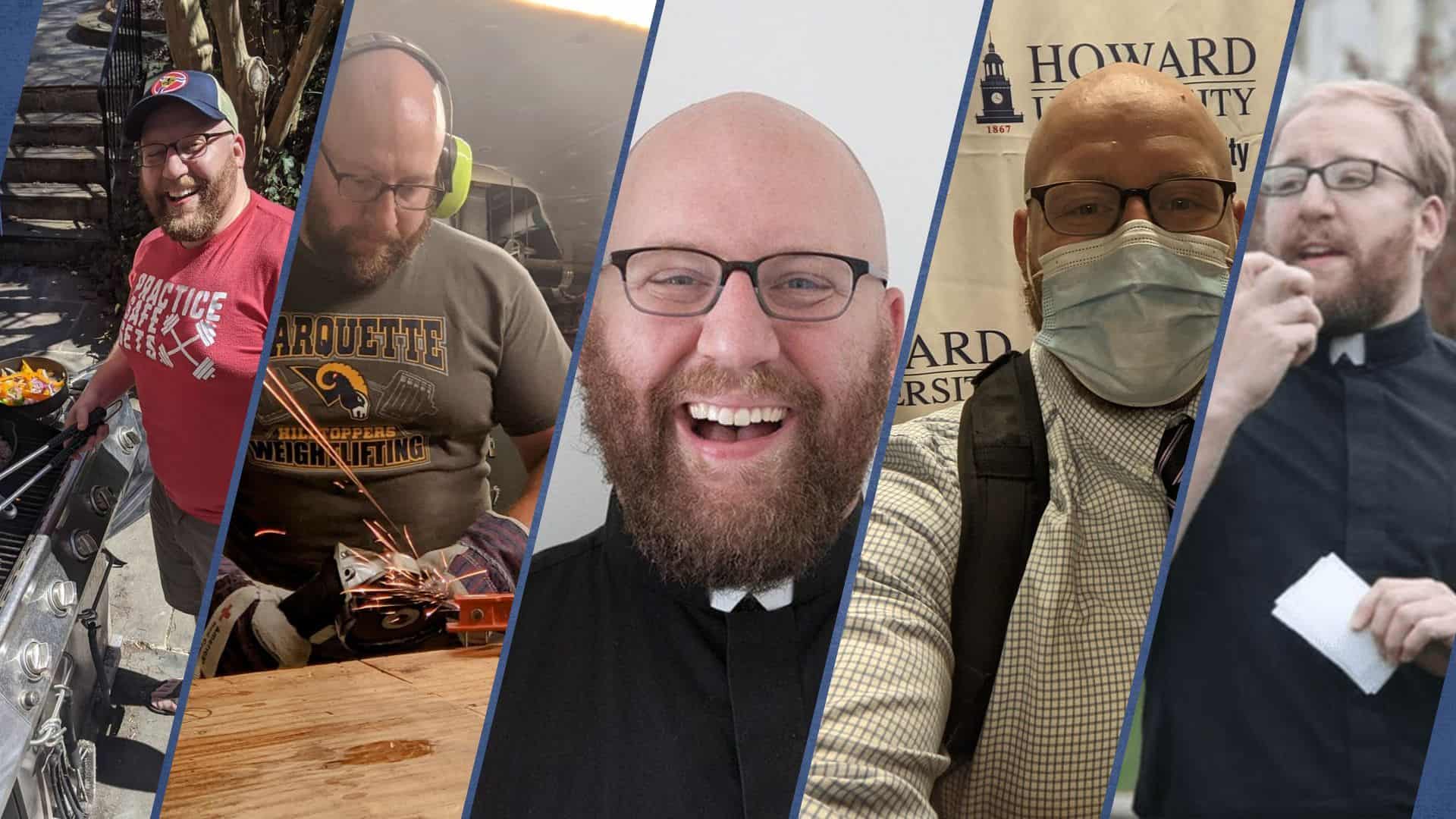The following reflection is part of our “Jesuit 101” series, celebrating the Ignatian Year. This piece helps us to better understand the vocation of Jesuit Brothers. To learn more, check out our explainer article: “Jesuit 101: Jesuit Brothers.”
When folks find out I’m a Jesuit brother, I regularly get two different but related responses:
- Response A: “Why are you a brother? Why not go all the way and become a priest?”
- Response B: “So, uh, what is a brother? I didn’t know Jesuits had those.”
I’ve heard these responses dozens of times since I took vows ten years ago. The simplest answer to the first is, “Because this is who God has called me to be.” And Br. Brent Gordon offered a great intro to what a brother is. But I think we need to dig a bit deeper into the assumptions built into those questions (and my own answers). They should prompt us to ask what we believe about our faith, about the priesthood, and about our own vocations. So, ironically, I’ll try to answer those questions about brothers with quotes from two Jesuit priests.
********
“In some ways the religious brother embodies religious life in its essence, and so is able to illustrate that life with particular clarity.” – Jesuit Superior General Peter Hans-Kolvenbach at General Congregation 34, 1995
In other words, if you want to know what a Jesuit is, look to a brother. We share with our fellow Jesuit priests the vows of poverty, chastity, and obedience. We share in our Ignatian spirituality and charism. These are the most fundamental aspects of what it means to be a Jesuit. Whereas a Jesuit priest is often identified by his sacramental ministry, the brothers have no such alternative markers. We are simply Jesuits.
Jesuit brothers are members of the laity. We take vows, but we are not ordained. 1 In being laypeople, we are like everyday Catholics. It would be disingenuous, however, to diminish the very tangible realities and differences between us as lay brothers and those not belonging to a religious order. We brothers often occupy a middle space, hovering between the clerical and lay worlds. 2
The vocation of a brother witnesses to the vows and what it means to be a Jesuit. This witness is both outward and inward. We share Ignatian spirituality through our various ministries and relationships. We are also meant to remind our Jesuit priests of who they really are and to smell like sheep.
“This I ask you [priests]: be shepherds, with the “odor of the sheep”, make it real, as shepherds among your flock, fishers of men.” – Pope Francis in his 5/28/13 Chrism Mass homily
 Historically speaking, brothers typically held common, working-class jobs. We were mechanics, farmers, cooks, business managers, tailors, and builders. I maintain this tradition today as a (hobby) woodworker, making tables, cutting boards, and benches. Though our jobs have (sometimes) changed, we bear the same prophetic responsibility. Our job is to help remind priests precisely how they serve and who they serve—humbly the people of God. For our fellow laypeople, our job is to be approachable and every day, to be radically available to those we serve.
Historically speaking, brothers typically held common, working-class jobs. We were mechanics, farmers, cooks, business managers, tailors, and builders. I maintain this tradition today as a (hobby) woodworker, making tables, cutting boards, and benches. Though our jobs have (sometimes) changed, we bear the same prophetic responsibility. Our job is to help remind priests precisely how they serve and who they serve—humbly the people of God. For our fellow laypeople, our job is to be approachable and every day, to be radically available to those we serve.
I’m reminded of one of the first moments this availability was concretized for me. I heard two students frantically whispering outside my classroom door, trying to determine exactly what they should share with me. One of them had made an imprudent life choice and wanted advice. At the end of our chat, I asked him why he sought me rather than one of the priests. He replied, “You’re just a normal dude. You got the whole God thing going on, but there’s less pressure.” I had expected him to say something about my being younger than the priests at the school, or having had me as a teacher. Instead, he identified me as a brother and therefore approachable.
Though with some clear failings, I do my best to maintain this availability to the people of God in my life. I work as a union and community organizer, connecting faith to people’s everyday struggles for justice and livelihood. As a historian-in-training, I pursue the prophetic call by writing about people’s everyday faith experiences. Among my fellow Jesuits, I do my best to bring the smell of the sheep. Sometimes this is quite literal when I regularly come to community Mass covered in and smelling of sawdust from the workshop. Often it is reminding our institutional administrations of the plights of workers and our responsibilities to workers and justice.
More often than not, however, my nearness to both laypeople and Jesuit priests is as simple as grilling out, offering hospitality, doing small repairs around the house, building furniture, and making runs to the airport. My availability is in being a good brother.
You might be asking, “But…why not go all the way and do those things as a priest?”
Priesthood is not the fulfillment or end goal of Jesuit formation and training. Being a good Jesuit is the goal. Our vows and spirituality make us who we are.
Nor is the sacerdotal priesthood the end goal or fulfillment of Catholic life! It is not a holier or more important vocation than any other call. Rather, we are each called to our fullest, holiest self. That fullest self may be found in a myriad of places. The gifts of the Spirit are bountiful.
********
 Because of a mix of our own Jesuit rules and Catholic culture, Jesuit brothers were commonly defined by education and job. As Brent noted in his essay, these definitions are no longer as prominent. 3 I’m currently working on a U.S. history PhD that traditionally would have been reserved for priests. 4 Today, the brothers’ vocation is better understood not by what we do but by questions of who and how we are.
Because of a mix of our own Jesuit rules and Catholic culture, Jesuit brothers were commonly defined by education and job. As Brent noted in his essay, these definitions are no longer as prominent. 3 I’m currently working on a U.S. history PhD that traditionally would have been reserved for priests. 4 Today, the brothers’ vocation is better understood not by what we do but by questions of who and how we are.
I first heard the call to Jesuit life at Mass at the Ignatian Family Teach-In for Justice during my junior year of high school. Having been terribly bullied throughout middle school, the Teach-In was the first place I felt at home, the first place I belonged. My call is tied to making the Church and the world a place where others can feel at home. When I entered the Jesuits and during the Novitiate, I realized a brother is precisely who I am called to be—a dependable Jesuit companion for those on the margins who will stand with you against injustice and celebrate your goodness.
Like many aspects of Catholic faith and theology, vocations are in part a mystery. Whereas jobs and promotions follow a certain logic, our vocations are more akin to falling in love. The question of “why” isn’t particularly helpful; “who” and “how” are more likely to yield fruitful discernment. Vocation is a call by both God and community, who and how they need you to be, to whom and how we will say yes to share God’s love. So what’s your vocation?
- In this way, our vows are similar to those of women religious like nuns and sisters; but it would be reductive and insulting to women religious to call brothers “male nuns.” ↩
- I recognize that according to our theology, we are all one Church. That theology as aspirational, and write this recognizing clericalism as the historical fact. ↩
- Francis—one of the Ghanaian brothers with whom I live—pointed out that in Ghana, brothers are more respected than priests because, “We have actual skills and can do things.” ↩
- There’s an old saying that, “There have been tons of good Jesuit brothers—unfortunately, we ordained too many of them.” I know several Jesuit priests who wanted to be Jesuit brothers and teachers, but the only way they were allowed to become teachers was by getting ordained. ↩


